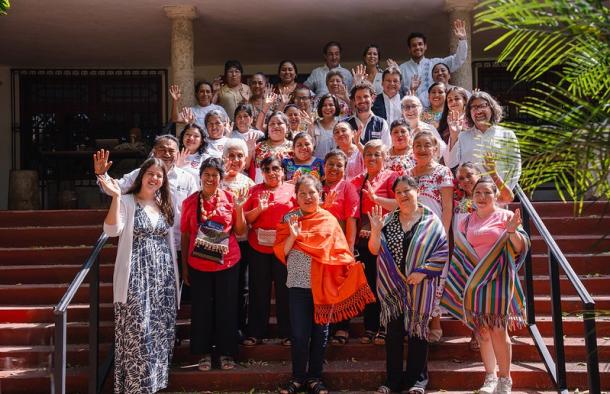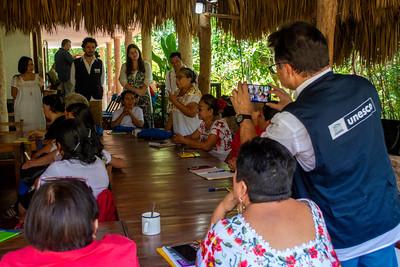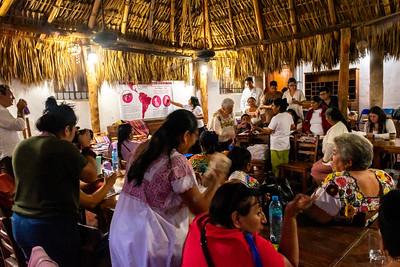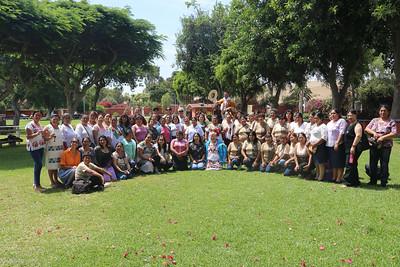For the first time, more than 60 artisans from Peru and Mexico, with UNESCO, exchanged knowledge on living heritage, creativity and innovation, and community organization.

At the closure of the Binational Textile Art Gathering for women artisans from Yucatán (Mexico), Cajamarca, Ayacucho, and Lima (Peru), organized by UNESCO, embroiderers and textile creators from Mexico and Peru developed proposals to safeguard their textile art as living heritage and to foster their economic development through creativity, community organization, and association.
This gathering served as a crucial space to identify strengths, opportunities, weaknesses, and threats within the textile creative sector and its knowledge as an intangible cultural heritage. It also aimed to develop concrete proposals to ensure sustainability and strengthen commercial capacities.
Participants are members of the projects "Segundo Vuelo", part of LATAM Airlines Peru's sustainability programme implemented by UNESCO Peru, and "Economic and social development with a gender perspective through textile art" by UNESCO Mexico, sponsored by Fundación Banorte and supported by the Government of Yucatán through its Secretariat of Culture and Arts (Sedeculta).

Guiomar Alonso Cano, UNESCO Representative in Peru, stated: "Today, artisans not only preserve traditional techniques but also innovate by combining ancestral knowledge with contemporary technologies and trends. In doing so, they honour the past while meeting the demands of the modern world, opening new opportunities in national and international markets. Textile art not only connects us to our roots but also serves as a driver of social and economic empowerment."
Mexican and Peruvian artisans highlighted shared challenges, such as the proliferation of digital industrial machines, difficulties in local cotton production, and the need to expand the market. However, they also pointed out opportunities for their communities and countries, including raising public awareness of the intangible cultural heritage they safeguard and the quality of the garments and embroidery they produce.
"I loved the gathering because I met people who came to see our work. (...) They shared their experiences, and I loved it because listening to others with different ideas is also important." said Florencia Sandonaz, Member of the SISAN Artisans Association - Pachacamac Museum and a beneficiary of the Segundo Vuelo programme.
The participants were chosen by their respective organizations to represent their voices beyond their own countries, sharing their traditional knowledge and work methods with other artisan organizations.
"Sharing and learning about all our work with our artisan sisters from this country is very special, something I will always carry in my heart. Taking a piece of Peru and them with me is wonderful." said Zelmy Dominguez, Mayan and yucatecan artisan.
UNESCO promotes knowledge exchange and the free flow of ideas to foster mutual understanding and create a more equal and peaceful world. The Binational Textile Art Gathering, along with two key projects, aims to revalue the textile work of women who are bearers of living heritage, strengthen their technical skills, and contribute to job, economic opportunities and gender equality.

"Artisans are the protagonists of these actions, and it is an act of justice for those who have been guardians of their heritage, the economy of their households, and their communities. UNESCO will continue to promote gender equality, including work on masculinities, as we do in Yucatán," said Andrés Morales, UNESCO Representative in Mexico.
Manuel van Oordt, CEO of LATAM Airlines Peru, reaffirmed the company's commitment to sustainability and the circular economy: "Sustainability is in our DNA and in our short-, medium-, and long-term goals. Segundo Vuelo aligns with our efforts to become a zero-waste-to-landfill group by 2027, while also focusing on vulnerable communities. Today, having three incredible artisan communities in Ayacucho, Pachacamac, and Cajamarca sharing their talent by giving a new life to the unused uniforms from our operations fills us with pride," he said.

"The development of women is a key pillar of Fundación Banorte's comprehensive programme because when women and families thrive, the society and the country thrive too. Safeguarding the textile art of our women means preserving our cultural identity and history," explained Jimena Prado Lebrija, Director of Fundación Banorte.
The Binational Textile Art Gathering for women artisans from Yucatán (Mexico), Cajamarca, Ayacucho, and Lima (Peru) included meetings in Lima on March 3-4 and in Yucatán on March 17-18. These gatherings were part of the work conducted by the UNESCO offices in Peru and Mexico.